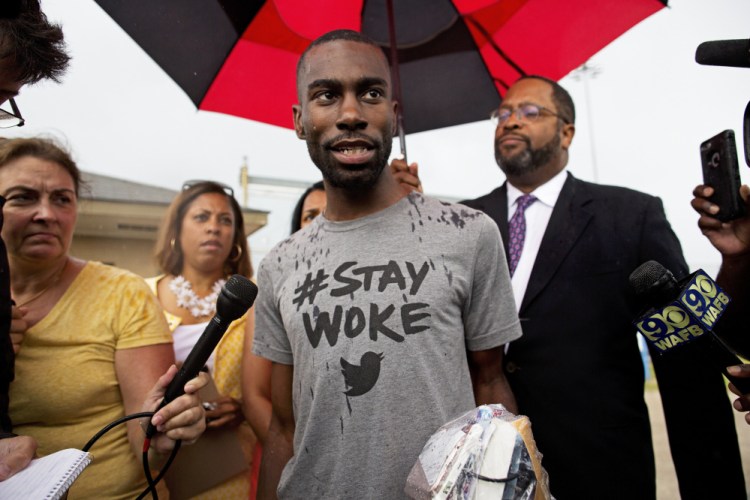DeRay Mckesson, a 2007 Bowdoin College graduate who has become a prominent social activist, was at the center of controversy over a Black Lives Matter protest in Baton Rouge, Louisiana, on Saturday after he was arrested for “obstructing a highway.” Mckesson was in the Louisiana capital protesting the shooting death of a black man by police last week.
Mckesson’s arrest was picked up by major national news outlets, including The Associated Press, The New York Times, NBC News and ABC News.
The protest was the latest example of social and political activism by Mckesson, a central figure in the Black Lives Matter movement. He was involved in protests in Ferguson, Missouri, after a black man was shot dead by a white police officer there in 2014, and unsuccessfully campaigned for mayor in his native Baltimore this year. While at Bowdoin, Mckesson was twice elected student government president at the college in Brunswick.
Hundreds of people were arrested in Louisiana during the weekend as protesters clashed with police over the death of Alton Sterling, who was killed Tuesday in a confrontation with two white police officers at a convenience store.
Mckesson tweeted from a Louisiana jail on Sunday that the protests bring attention to issues between police and blacks, heightened by the death of Sterling and others.
“I think of protest as truth-telling in public. And I will never be afraid to tell the truth,” Mckesson said on his Twitter account.
He also tweeted some slice-of-life moments of spending a day in jail, such as how the fluorescent lights make it difficult to sleep.
“Jail breakfast is awful, and they’d be much better off buying apples to replace the ‘oatmeal’ and the OJ is grainy,” Mckesson tweeted.
Attempts by the Portland Press Herald to reach Mckesson, who was released on bond Sunday, were unsuccessful Sunday evening.
Mckesson was arrested Saturday by the East Baton Rouge Sheriff’s Office as he was protesting in the streets, the AP reported. Mckesson stayed in the road despite being warned by police to leave, according to a police affidavit. Witnesses said Mckesson was tackled by several officers and arrested.
The fatal shootings by police of Sterling – and of Philando Castile, another black man, in Minnesota the next day – have been protested by blacks. Then on Thursday, five Dallas police officers were shot dead by a black man who authorities said did so as “payback” for blacks who were shot by police.
The events have touched off a national conversation about the relationship between police and the black community. Blacks have often complained that they are targeted by police and treated with suspicion without reason, such as during routine traffic stops.
Dallas Police Chief David Brown, who is black, told CNN that Americans should “stand up” to support police.
“These officers risk their lives for $40,000 a year,” Brown told CNN. “And this is not sustainable, not to support (police officers).”
Mckesson told the Bowdoin Orient student newspaper in 2014, when he was protesting the shooting death of Michael Brown, an unarmed black man, by a white police officer in Ferguson, a St. Louis suburb, that simply being black should not be perceived as a threat.
“At night in a hoodie, I’m another Trayvon Martin,” Mckesson said, referring to the 2012 incident in Florida in which the black teenager was shot and killed not by police, but by George Zimmerman, a neighborhood watch volunteer. Zimmerman was acquitted in 2013, successfully arguing self-defense.
“I am not a Bowdoin grad – I’m a black guy in a hoodie,” Mckesson told the Bowdoin Orient. “I understand that my blackness is how people experience me first sometimes, for better or for worse, and that’s real.”
Among Mckesson’s media appearances was a January booking on “Late Night with Stephen Colbert,” during which he and Colbert discussed “white privilege.” Mckesson sat at Colbert’s desk while the host sat in the guest chair.
“I think that people are uncomfortable talking about the racist history in this country and what we need to do to undo the impact of racism,” McKesson said on the show. “People would just like to act like we don’t have a legacy of racism here, so I think people get really uncomfortable with it. But we know we can’t change it unless we address it.”
Send questions/comments to the editors.




Success. Please wait for the page to reload. If the page does not reload within 5 seconds, please refresh the page.
Enter your email and password to access comments.
Hi, to comment on stories you must . This profile is in addition to your subscription and website login.
Already have a commenting profile? .
Invalid username/password.
Please check your email to confirm and complete your registration.
Only subscribers are eligible to post comments. Please subscribe or login first for digital access. Here’s why.
Use the form below to reset your password. When you've submitted your account email, we will send an email with a reset code.